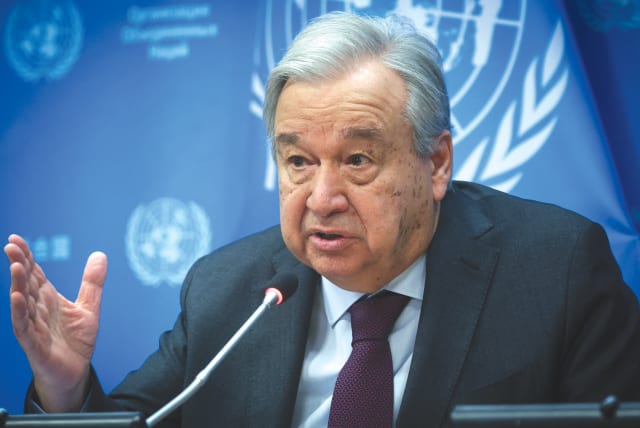 Israel’s foreign minister declared UN Secretary General Antonio Guterres ‘persona non grata’ and was henceforth banning him from entering Israel, according to a post on X/Twitter on Wednesday.
Israel’s foreign minister declared UN Secretary General Antonio Guterres ‘persona non grata’ and was henceforth banning him from entering Israel, according to a post on X/Twitter on Wednesday.
US State Department Spokesperson Matthew Miller later stated the US believes this step is “not productive at all” due to the UN’s role in the region.
“One of the things we’ve always said that Israel needs to be cognizant of throughout this conflict is its standing in the world, and steps like this are not productive to improve its standing in the world,” Miller added.
The ban on entry, said FM Israel Katz, was due to Guterres’s failure to “unequivocally condemn” Iran’s massive missile attack on Israel.
“Anyone who cannot unequivocally condemn Iran’s heinous attack on Israel, as almost every country in the world has done, does not deserve to step foot on Israeli soil,” Katz wrote.
He added that Guterres is yet to denounce the October 7 massacre, which is approaching its one year anniversary, or condemn Hamas’s use of sexual violence.
Katz also criticized the Guterres for not leading “any efforts to declare [Hamas] a terrorist organization.”
“A Secretary-General who gives backing to terrorists, rapists, and murderers from Hamas, Hezbollah, the Houthis, and now Iran—the mothership of global terror—will be remembered as a stain on the history of the UN.”
“Israel will continue to defend its citizens and uphold its national dignity, with or without António Guterres,” he concluded.
Following Israel’s invasion of Lebanon on Monday, Guterres posted on X/Twitter that he was concerned with the escalation and said an “all-out war must be avoided in Lebanon at all costs, and the sovereignty and territorial integrity of Lebanon must be respected.”
Following the Iran attack on Israel on Tuesday night, Guterres called for a ceasefire.
Israel was not mentioned in the posts.
Failure to condemn Hamas
In April, the United Nations omitted Hamas from its blacklist of state and non-state parties guilty of sexual violence in 2023, due to a lack of what it deemed to be credible evidence.
The blacklist was part of a larger annual report on sexual violence authored by UN Secretary-General Antonio Guterres.
Israel’s Foreign Minister Israel Katz said he was “disgusted” by the report in a statement released to the media.
“Guterres has turned the UN into an extremely antisemitic and anti-Israel institution during his tenure which will be remembered as the darkest in the organization’s history,” Katz said..
Meanwhile, Iran revealed that it launched a barrage of missiles at Israel in response to the assassinations of senior Hezbollah, Hamas and Iranian officials, sending Israelis rushing to bomb shelters and raising fears of all-out war in the region.
Alarms sounded across Israel and explosions could be heard in Jerusalem and Tel Aviv during the attack late on Tuesday.
Israeli military spokesman Daniel Hagari said there were no reports of casualties and that the army does not see “any more threats in our airspace”. He said in a video message that people in Israel were safe to leave shelters.
Israel’s emergency services said at least two people sustained light injuries “from shrapnel in the Tel Aviv area”.
The Palestinian news agency Wafa, citing the civil defence, said a 38-year-old Palestinian man died from shrapnel wounds in Jericho in the eastern occupied West Bank.
Iran’s Islamic Revolutionary Guards Corps (IRGC) said the missile attack on Israel was a response to the killing of Hezbollah chief Hassan Nasrallah and the IRGC commander Abbas Nilforoushan last week, as well as that of the Hamas leader Ismail Haniyeh earlier this year, Iran’s Fars news agency reported.
“In response to the martyrdom of Ismail Haniyeh, Hassan Nasrallah and Nilforoushan, we targeted the heart of the occupied territories,” the IRGC said in a statement.
It said its missile attack targeted “three military bases” in the Tel Aviv area.
Earlier, the IRGC said it launched tens of missiles at Israel, and that if Israel retaliated, Tehran’s response would be “more crushing and ruinous”.
Iran’s state television said 80 per cent of the missiles launched at Israel hit their targets.
The Israel military, meanwhile, said a “large number” of missiles had been intercepted.
Speaking to reporters, Hagari said the attack was serious and would have consequences “in a timely manner”.
A senior Iranian official told the Reuters news agency that the order to launch missiles at Israel was made by the country’s Supreme Leader Ayatollah Ali Khamenei. Khamenei remains in a secure location, the senior official added.
The United States said its forces were ready to provide “additional defensive support” to Israel after helping protect it from the Iranian missile attack.
“Our forces remain postured to provide additional defensive support and to protect US forces operating in the region” after “defending against Iranian-launched missiles targeting Israel”, a US defence official said on condition of anonymity.
● By Jerusalem Post & Aljazeera


